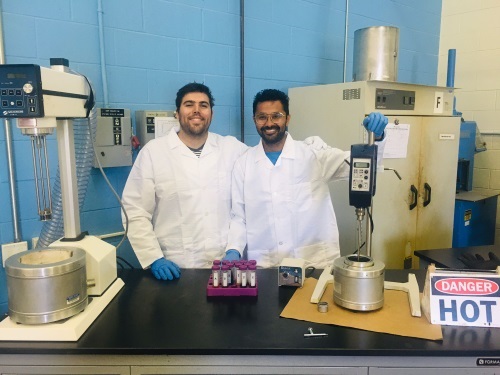The Illinois Department of Transportation is working with the Illinois Center for Transportation to develop more “sustainable pavement practices,” which includes ways to incorporate more recycled materials such as plastic into asphalt mixes.
[Above photo by the Illinois DOT]
Both are working on a joint project – dubbed “R27-196-HS: Rheology-Chemical Based Procedure to Evaluate Additives/Modifiers Used in Asphalt Binders for Performance Enhancements: Phase 2” – to investigate methods to “soften” asphalt binder to reduce pavement cracking.
As recycled materials are added to hot mix asphalt, the asphalt tends to harden and become brittle, potentially leading to premature cracking, the project found.

“Asphalt binder keeps the aggregate together in the pavement just like corn syrup or sugar keeps the granola together in granola bars,” noted B.K. Sharma, senior research engineer at Prairie Research Institute’s Illinois Sustainable Technology Center, in a blog post. “It’s a gluing material that keeps the aggregate together for a very long period of time.”
His team is adding different “modifiers” or softening additives to asphalt binders to improve long-term pavement performance. After examining the mechanical and chemical properties of the modified binders, the research team proposed testing protocol and thresholds for different performance indicators to ensure desired pavement performance and validated them with field samples.
“The protocol and thresholds suggested from this work are unique and ones that have been highly sought after nationally,” explained Kelly Morse, Illinois DOT’s chief chemist, who is working on this project with Sharma. “The ability to implement a protocol to vet the performance of modified binders’ rheological and chemical properties in both the un-aged and aged condition will provide a significant contribution to the state practice for asphalt binder testing and qualification.”
Other state departments of transportation are conducting similar research with asphalt mixes infused with recycled materials.

For example, the Pennsylvania Department of Transportation recently wrapped up a pilot project that uses pellets made from grocery bags, milk jugs, and other recyclable plastics in an asphalt reconstruction project.
Those pellets are being added to the asphalt in two quarter-mile test sections of the project at the entrance to Ridley Creek State Park, about 15 miles west of Philadelphia.
The expected benefits from this project include diverting waste plastics from landfills, helping to establish a market for recycled plastics, and extending the useful life of asphalt pavements, PennDOT said.
 States
States


